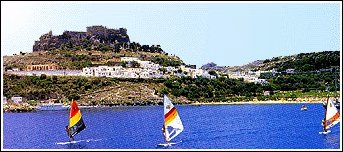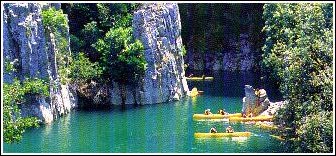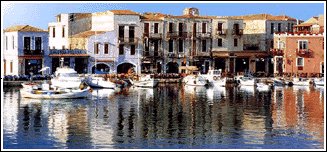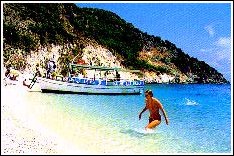|
Try our legendary hospitality |
Home I About Us I Our Hotels I Reservation Form I More About Tolo I Magic Peloponnese I Holidays in Greece
The Greek peninsula, covering an area of 131,944 square kilometres and containing a population of about 10,000,000, consists of mainland Greece (Attica, the Peloponnese, Central Greece, Thessaly, Epirus, Macedonia, Thrace) and the Islands. Geographically it belongs to Europe since it forms the most southerly extremity of the Balkan peninsula but it also has a special link with Europe through the small entity of the Ionian Islands (Zante, Ithaca, Corfu, Cephallonia, Lefkas and Paxi) which form a chain off Greece's western shores in the Ionian Sea.
Parthenon, ATHENS
Attica and
Saronic Isles
Athens
| Aegina
| Salamis
| Hydra | Spetses | Poros
The Saronic Gulf which is the stretch of sea
linking the shores of Attica to those of the Peloponnese, contains a further
group of small islands (Salamis, Aegina, Poros, Hydra and Spetses) which
adds its variety to the general surroundings.
Santorini, CYCLADES
Cyclades
Islands
Amorgos
| Anafi
| Andros
| Antiparos
| Delos
| Folegandros
| Ios
| Kea
| Kimolos | Kythnos | Mykonos
| Milos | Naxos
| Paros
| Santorini
| Serifos | Sifnos | Sikinos | Syros
| Tinos
There are the numerous islands of the Aegean
Sea, some isolated like Crete to the South, Ikaria, Chios and Lesbos to
the East, Thassos and Samothraki to the North. The Cyclades consist of
39 islands of which 24 are inhabited, the more important ones being Amorgos,
Anafi, Andros, Antiparos, Delos, Ios, Kea, Kimolos, Folegandros, Milos,
Mykonos, Naxos, Paros, Santorini (also called Thera), Serifos, Sikinos,
Sifnos, Syros.

Lindos, RHODOS
Dodecanese
Islands
Astypalaia
| Agathonissi
| Halki
| Kalymnos
| Karpathos
| Kassos
| Kos | Leros
| Lipsi
| Megisti | Nisyros
| Patmos
| Pserimos | Rhodos
| Symi
| Telendos | Tilos
The Dodecanese group consists of twelve major
islands, Astipalea, Kalymnos, Karpathos, Kassos, Kastelorizo, Kos, Lipsos,
Leros, Nissiros, Patmos, Rhodos, Symi and a number of smaller islands,
each with its distinctive features and peculiarities.
The Sporades, consisting of Alonissos, Skiathos,
Skopelos and Skyros, lie of the eastern shores of mainland Greece and retain
their genuine island characteristics and unchanged local traditions.

Kremasta lake, EVRITANIA
Central
Greece
Evritania
| Etoloakarnania
| Fthiotida
| Fokida
| Viotia
Variety is, in fact, the hallmark of the Greek
geographical landscape generally. On the one hand, there are high mountains
and entire mountain ranges such as the Pindos range (also known as Greece's
backbone) or Mount Olympus (with its summit the Pantheon, the highest peak
in Greece at an altitude of 2,917 meters) and the mountains of Macedonia
and Thrace intersected here and there by a few valleys through which relatively
small rivers flow.

Rethymnon, CRETE
Crete
Agios
Nikolaos | Hania
| Ierapetra
| Iraklion
| Rethymnon
| Sitia
On the other hand, the endless lacework of
the coastline produces a series of scenic surprises. It is these heavily
indented shores which give Greece such rare beauty, quite unique in the
Mediterranean. The length of the Greek coastline is estimated at 15,000
kilometers. The marked variety of the terrain above water continues under
water, along the seabed which, millions of years ago, formed a projection
of the land. Close to Cape Tainaron, (Tenaro) off the South tip of the
Peloponnese, the so-called Oinousai (Inousses) Pit is 4,850 meters deep
which is the deepest point in the Mediterranean.

White water rafting
Epirus
Ioannina | Konitsa | Metsovo | Zitsa | Parga | Preveza
| Igoumenitsa
Vegetation and climate conform with the variations
in the geographical area. The variety of plants is exceptional some 6,000
indigenous species having so far been recorded, 250 of which flourish on
the island of Crete. It is an impressive figure due to Greece's geographical
position between Europe and Africa.
Plants associated with the joys of life are
the country's countless vineyards. Major vegetation is likewise peculiar
and above all made to man's measures. The trees are of medium height and
vary from pine, oak, fir, olive and mulberry trees to fruit and palm trees.

A beach in Lefkada
Ionian Islands
Corfu | Paxi | Lefkada
| Cephalonia | Ithaca | Zakynthos
Another result of the country's geographical
location is also seen in its climatic range with mild winters and sub-tropically
warm summers cooled by a system of seasonal breezes popularly called "meltemia".
Lastly, an outstanding feature of the Greek
climate is its ample sunshine.
It is no exaggeration to state the sun shines
in Greece for 3,000 hours per year
Macedonia
Thessaloniki | Kavalla | Halkidiki
The theatre in EPIDAVROS
Peloponnese
Argos | Corinth
| Epidavros | Loutraki
| Mistra | Monemvasia
| Mycenae | Nafplion
| Olympia | Sparta |
Tolo | Patra | Aegion | Kyllini | Pylos | Kalamata
If you are looking for fine beaches and a
chance to enjoy the history and culture of ancient Greece and still be
away from the crowds then consider the Peloponnese. The Argolis is the
heart of classical Greece - Epidavros ( famous amphitheatre ), Mycenae,
Olympia, Sparti, Mystra. It makes a wonderful introduction to the sites
of ancient Greece for first time visitors, and its harsh barren - mountains
stir historians with their evocatives shapes, sheltering the plain of Argos
and a fitting backdrop to the beautiful blue bay of Tolo, studded with
islands or the ancient and charming town of Nafplion.
METEORA
Thessalia and Sporades Islands
Pelion | Meteora
| Kalambaka | Skiathos | Skopelos | Skyros
![]()
Pages created by
Family Georgidakis
Hotels
and Bungalows
Home I About Us I Our Hotels I Reservation Form I More About Tolo I Magic Peloponnese I Holidays in Greece